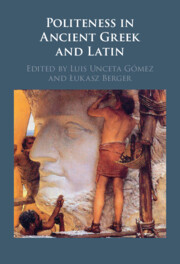Book contents
- Politeness in Ancient Greek and Latin
- Politeness in Ancient Greek and Latin
- Copyright page
- Contents
- Figures and Tables
- Contributors
- Preface
- Abbreviations
- Part I Introduction
- Part II The Expression of Im/Politeness
- Part III Im/Politeness in Use
- Part IV Ancient Perceptions on Im/Politeness
- Chapter 12 Being Polite the Roman Way
- Chapter 13 Impoliteness outside Literature
- Chapter 14 Politeness in Ancient Scholarship
- Glossary
- References
- Index Rerum
- Index Locorum
Chapter 12 - Being Polite the Roman Way
Comments about Im/Politeness in the Comedies of Plautus and Terence
from Part IV - Ancient Perceptions on Im/Politeness
Published online by Cambridge University Press: 08 September 2022
- Politeness in Ancient Greek and Latin
- Politeness in Ancient Greek and Latin
- Copyright page
- Contents
- Figures and Tables
- Contributors
- Preface
- Abbreviations
- Part I Introduction
- Part II The Expression of Im/Politeness
- Part III Im/Politeness in Use
- Part IV Ancient Perceptions on Im/Politeness
- Chapter 12 Being Polite the Roman Way
- Chapter 13 Impoliteness outside Literature
- Chapter 14 Politeness in Ancient Scholarship
- Glossary
- References
- Index Rerum
- Index Locorum
Summary
Metapragmatic comments, that is, comments that reflect the understandings of speakers or lay observers regarding the ways and aims for which the language is used, are one of the main means of access to native ideas on im/politeness in corpus languages. This chapter analyses the metapragmatic comments on im/politeness that can be identified in the comedies of Plautus and Terence, as a mean to understand the Roman conceptions of im/politeness (that is, the emic perspective of this phenomenon), and the social and moral order underlying those conceptions. This approach facilitates a more detailed and integrated analysis of the speaker’s intentions and/or the interpretation of a particular utterance as polite (or impolite or overpolite) by the addressee, whether or not there are linguistic markers to indicate this intention.
- Type
- Chapter
- Information
- Politeness in Ancient Greek and Latin , pp. 295 - 316Publisher: Cambridge University PressPrint publication year: 2022

